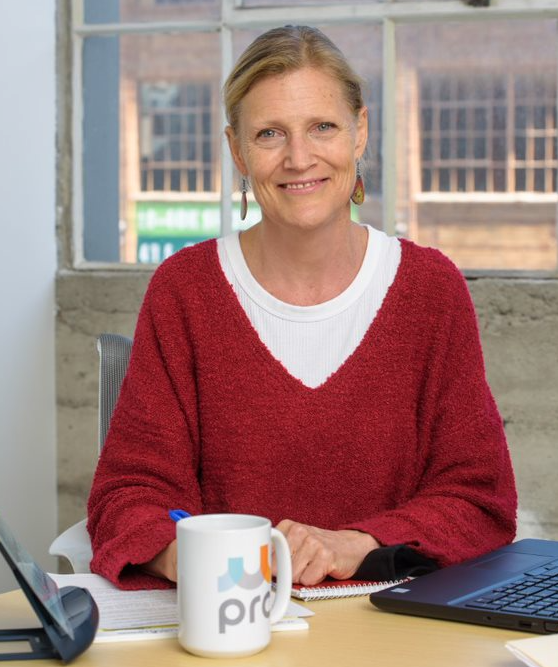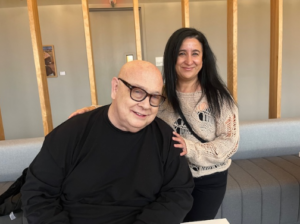An Advocate for our Clients

“It’s got to be terrifying for somebody to be sitting on the other side of the desk from me, a stranger, asking all kinds of very personal questions.
Time is of the essence with this work. If I don’t get a given item completed and filed, then it doesn’t happen for that client and there’s a penalty. I cannot let it be my failure that costs somebody else a step towards their livelihood.”
If you’re fortunate, you’ve probably never needed to apply for Social Security Disability (SSD) benefits. There are mounds of paperwork, systems to understand and access, and numerous obstacles that can cause frustration and confusion. But for our clients in need of SSDI, these frustrations are heightened by life circumstances, confusing medical processes, and a fear of making mistakes that will most certainly delay the critical assistance they depend on. That’s where PRC steps in. Our Legal Advocacy team understands both sides of these situations, and they’ll do everything they can to help clients navigate this stressful process.
Liz Pickell is a Senior Benefits Advocate here at PRC, and she’s been helping people find their way through the maze of paperwork, bureaucracy, and health system processes since the late 1980’s. She’s got a special talent for making sure clients acknowledge their work-limiting conditions and how to convey the information required to medical providers and SSD, all with a personable approach and a friendly smile. We sat down with Liz recently to get to know more about her and her role.
A self-proclaimed refuge from the Deep South, Liz grew up in Alabama and earned her Master’s in Counseling at the College of William and Mary in Virginia. She quickly realized that counseling was not what that she wanted to do. Instead she preferred the tangibility of social work and transitioned into assisting HIV/AIDS patients to obtain SSD benefits. In the late 1980’s however, the AIDS pandemic was taking the lives of her clients before they could receive benefits, and this took its toll on Liz. AZT, a breakthrough drug, would eventually give those suffering from HIV/AIDS and Liz a hopeful outlook, but the medication’s side effects also added to her clients need for benefits.
After working for the Red Cross in St. Louis following the floods in 1989, Liz worked for another AIDS service organization, and then as the Director of Social Work for an Agency on Aging. A life change eventually enabled her to sell her house, then she and her Lab-Shepard mix rescue dog embarked on a year of driving across the country to explore. Having previously traveled to San Francisco, the only place hosting HIV/AIDS-focused conferences in the early years, Liz fell in love with the beauty of Northern California and the dedication of local non-profit organizations. Liz then accepted a job with United Behavioral Health in the East Bay where she assisting with mental health claims for nearly twelve years. Two and a half years ago, Liz came across a PRC job posting for an attorney. Although she’s not an attorney by trade, her skills were a perfect fit for the role. On Valentine’s Day 2019 she joined PRC’s Legal Advocacy team.
“When I read PRC’s values statement I thought: Now this I can totally get behind,” Liz exclaimed. “This resonates with me!”
When asked what prompted the change from more intensive work, Liz responded:
“I had reached a point in my career where I was doing in-depth case management and being deeply involved in supporting someone in the broadness of their life. It was really overwhelming, and it was a lot to handle. One of my strengths is my empathy and my ability to connect with people, but my weaknesses is my lack of setting boundaries. To make a connection with clients, you have to open up on a personal level. While working for PRC, I’m able to put my energy where my ethics are. I’m focused on a narrower slice of a client’s life, so that I can maintain a heart space that helps me avoid compassion fatigue. I think that if you have the heart for this type of work, you should honor that and put yourself out there.”
So, what do you like about your role as a Senior Benefits Counselor at PRC?
“I really like what I do, I like the paperwork—I’m one of those nerdy people. I help to convey the experiences of our clients, so that Disability Analysts and Social Security doctors can understand them. That’s my whole focus.”
How difficult is it to accurately describe an individual to Social Security?
“People who do their own applications routinely withhold information about their true lived experiences. For example, nobody wants to say ‘I feel so bad that I can’t take a bath for 5 days sometimes,’ or ‘I can’t clean up my room or do laundry.’ There’s a sense of pride, and you want to appear to be a good patient so that you get the right care.
I ask people to tell me what it’s like on their worst days, because that’s why they need SSD. I tell them that If all of your days were your best days, you wouldn’t be talking to me. What is it that makes things not work for you? What gets in the way of your being able to hold a job? Often times people might say that they can bathe and dress without a problem, but what they don’t say is ‘I have to sit down and rest after I pull up my pants because I’m out of breath, then I have to stand up and I can button them, but it’s really hard because I have arthritis in my hands.’ Or, ‘I have to slip on my shoes because I can’t bend over and tie them.’ People don’t say those other things, sometimes it’s due to pride, and sometimes they don’t realize how they have adapted.”
How are you able to get clients to open up about their worst days?
“I let them know that I have issues too – that I live with depression. I am honest about this and sometimes share this with my clients. I ask clients the questions in a way that allows us talk about what really happens when they’re trying to get through their day. What things really look like. I let them know that I won’t shame them for their truth, and that I see them as much more than their symptoms, but that SSD only cares about documented symptoms.” I also tell clients, we’re going to be talking about things that are obstacles in your life. You’re a whole person, this is a little tiny slice of your life, talking to me is a little tiny slice, you’re telling me all of the things you’re having trouble with, I don’t see you as the obstacles.”
It seems to me that you have an amazing talent relating to people and getting them to speak to you as a friend.
“Thank you! I try to make it less intimidating, I tell them, let’s think about the SSD system as second graders, things are not necessarily understood at firsthand, so we really need to describe things in detail. I do this to make the bureaucracy feel less intimidating.”
What aspects of your job do you find most rewarding?
“There’s so much really. My colleagues here are fabulous! I get to work with so many bright, ethical human beings. People are here because they’re passionate about the work. We really work by PRC’s values. Within our department there’s a nice interplay of skills and abilities. We rely on each other’s strengths to make things work efficiently. I also like knowing that I’m able to help somebody take better care of themselves. One of the most rewarding things is to be able to give someone a voice that allows them to gain access to needed support or to advocate for themselves. This work makes me a big advocate of universal basic income, because for many people who are disabled, they are too disabled to prove they’re disabled, and that makes me angry.”
And what are the challenges of your job?
“COVID has completely changed our process for initial applications. We used to meet with people and do intakes in-person. We would do all of the paperwork, put together their application packet, tie it up nice and neat, and say, ‘take this to social security and file your application.’ Some people would take it in right away, some would not, and some would lose it, but it would be their responsibility to physically file their application. At the time of filing, Social Security Representatives would complete additional paperwork with clients. That system created an opportunity for me to help with securing supporting documentation like medical records, talking to doctors, and writing letters of support. Now with COVID, clients aren’t able to submit their applications in person, so we worked out a process to submit the claims for the client. The natural flow of the shared process is interrupted, and creates much more paperwork on our part.”
How many clients would you say you help on average per year?
“On average we serve 1,500 clients per year, and we serve most clients for more than a year. It just depends on their case. My case load averages 50 to 60 clients, all at different levels of the process. For example; a brand-new client takes a lot of time because we have to get to know them, build trust, and learn about everywhere they are receiving care. That’s when we’re getting the most medical information together. There are multiple process however, and each of them take time. If an application is rejected, then we go through an appeals process and that alone can take a year or longer.
Is there anything else you would like to share with our readers?
“I think people should be aware of how incredibly difficult it is for someone who is disabled to prove that they are disabled. It’s really hard. They have to create the evidence by getting to the doctor regularly, and feel comfortable enough with their doctor to really tell them what’s going on. That can be very hard for people. Clients have to remember to contact me when they get something in the mail from Social Security and NOT fill out any forms on their own, especially if they’re living on the street or in a single residence occupancy (SRO). The best thing we can do is encourage people and help them to see the link between how they take care of themselves, and how that can result in some financial support so that they can have more resources that improve their quality of life. One of the most important aspects of my job is keeping communication open and helping people navigate the immense amount of paperwork. Its very labor intensive, and it’s imperative that we make the time to focus on what it takes for them to get the benefits.”
“Lastly I would like people to know how thankful I am that PRC exists, and that it seriously lives its values.”
If you enjoyed reading about Liz and our Legal Advocacy program, keep an eye out for more PRC staff highlights in next month’s edition. You can also access past staff highlights and client stories here. Please also consider making a donation which will allow PRC to help more people find their path to a better future.



